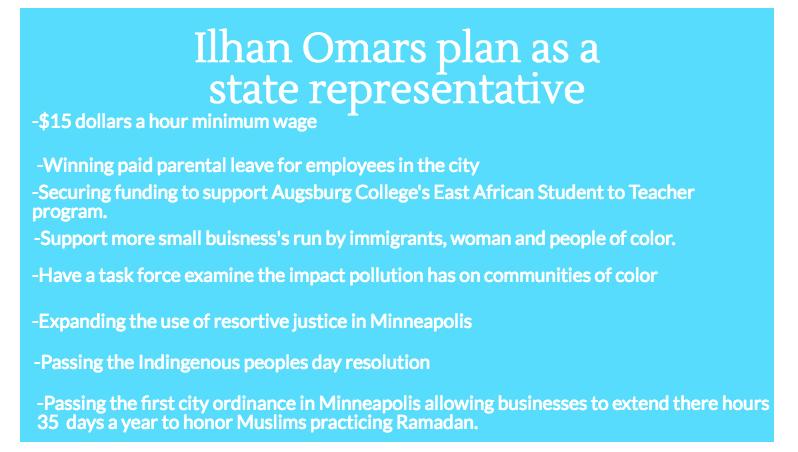Ilhan Omar breaks barriers for women and Muslim students
December 7, 2016
Ilhan Omar’s plans as the newly elected state representative. Omar is the first Muslim woman to be elected as state representative, and this has excited many in the Muslim community. Graphic: Shadia Nurein
Breaking barriers, Ilhan Omar made a historic win becoming the United States’ first Somali-American legislator. With a large Somali as well as non-Somali support, Omar paved a way for women, Muslims and the black community.
Omar was born in Somalia in 1982. She was the youngest of seven siblings her mother died when Omar was young, and was raised by her father and grandfather. When the civil war broke out in 1991, Omar and her family went to Kenya and lived in a refugee camp for 4 years. Her family immigrated to the United States in 1995, first living in Virginia and in the same year moved to Minneapolis Minnesota. Omar learned English in 3 months. Omar graduated from Edison high school and the got her bachelor’s in political science, international studies and business administration from North Dakota state university.
Omars love for politics began when she was 14 years old. She would go to caucus meetings with her grandfather and interpreted for him. Omar was the senior policy advisor aide for Minneapolis City council member Andrew Johnson. Omar has served on many nonprofit organizations, and is currently the the vice president of the DFL feminist caucus. As a state legislator Omar hopes to get paid parental leave for city employees, help small businesses that are owned by people of color, immigrants and women, expand the use of restorative justice in Minneapolis, and making the first city ordained law to allow businesses to have extended hours 35 days a year for Muslims practicing ramadan, raising the minimum wage to 15 dollars an hour plus many more.
For more on Muslim South student’s reactions to the elections, Click Here
In today’s society, youth seeing people who look like them doing big things like Omar has, creates a great impact in their lives giving them the opportunity to know that they can do what they put their minds to: “It showed me that I can actually do anything being a Somali Muslim girl in America” said Fathiya Musse, a South sophomore.
After Trump made an appearance in Minnesota the Sunday before the election, he tried to leave an impression on the audience that Somali people are bringing “disaster” into Minnesota. Omar’s win will show people: “Somalis aren’t just here to take but we’re also here to give to America specifically to Minnesota,” as said by Salma Hussein, a social worker at South.
Omar’s strong will to keep going will empower many women. They will see a person who didn’t back down and proved many wrong. “Some of the leaders in this city and a lot of people that I admire had bought into the narrative of misogyny that they believed existed in my community and didn’t think it was possible for a woman to win this seat in my community,” Omar said in her victory speech after winning the primaries.
Although this win may seem small to some people, the vision is in the bigger picture of what this country can look like and hopefully will in the future as youth see a woman following her dream and overcoming obstacles that came her way. After Omar’s permanent mark in history a young girl’s dreams now seem more achievable. “African-American girls will know now that they can do that or even better,” said Mohamed Alabari, the ELL (English Language Learners) coordinator at South. “This is to empower you [ black youth] to let them know that anything you put your mind and your time and your effort into you can have it,” explained UMOJA adviser Saida Hassan.
“We did it,” is how Omar began her victory speech and how many in the Somali community, Muslim community and women feel, knowing that this will be a significant moment in their lives as elders, youth and generations to come. “It affects all of us,” said Alabari, explaining that even those who thought that this wouldn’t be possible.
